Ordered to shoot protesters in Tahrir Square, attempting to declare independence for Alexandria and forced to work for the only company with phone signal: five ordinary Egyptians tell their extraordinary stories about the 18 days that shook the world.
Locked inside the offices of the only company to have network coverage, Ahmed*, a 22-year-old footballer, tells of his escape to rejoin Tahrir Square:
I was shot in the back, my skull fractured by bullets, on 28 January by a Central Security Forces (CSF) officer next to Omar Makram Mosque, after skipping work to join the Tahrir protests.
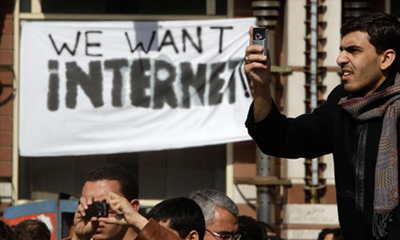
Egypt's internet and network coverage shutdown amid protests against Hosni Mubarak (Photo: AP)
At the time, I had been part of a technical support team at a call centre that serviced a Canadian travel website, located near Ramses Square in downtown Cairo.
Even though I was injured, I couldn't take any more time off work. So on 3 February, I went to work as normal.
But something was wrong.
When we finished our shift and I tried to leave, I found all the doors had been locked. I looked out of the window to see that the army had surrounded the building.
Management stopped all the technical support from leaving the office.
After the authorities cut the internet and phone lines on 28 January, it turned out that we were one of the only companies in Egypt to still have a phone signal.
I still don't know how, or why, but clearly they saw an opportunity to make money.
They had a monopoly; they were able to direct their coverage to the mobile networks, making a fortune. So, since that point, they had stopped employees from leaving the premises.
I went back to my manager and said I wanted to leave. I remember him saying, ‘No, the army won't let you leave, but we'll pay you extra if you work.’
It was only later that we discovered that the army had never given this order.
Suddenly, the company brought us blankets and clothes, along with fancy food and drinks – whatever we wanted, no matter the price. I remember thinking that four or five days of this food would equal my monthly salary. We were told to camp out on the floor.
Because I was under 21 at the time, they had to get permission from my parents. My mother, who knew I had had been badly injured in the square and was terrified of me returning to the clashes, said yes; she was happy for me to stay. There was no way out.
For the others, they needed the money, so even the girls stayed. We worked all day and slept on the floor of our offices at night.
I was really tired, especially given my injuries, and wanted to go back to the square. The company never explained why they were holding us like prisoners.
So I refused to work and started fighting with my manager. I told him, ‘I’m not staying in a jail.’
Four days into my incarceration, the parents of one of the girls turned up and said, ‘We want our daughter back – you can't lock her up.’
I knew this was my only chance. When they opened the door to let the girl out, I ran. As I was running, I remember someone saying: ‘If you don't come back, you're fired!’
I was there for four days. Some people stayed for nine, working for an organisation that saw a business opportunity in the revolutionary upheaval.
The company later sent us a letter thanking us for our work and explaining how we deserved extra cash. But they only paid us an additional month’s salary and never explained it.
Because I escaped when Hosni Mubarak stepped down, I was able to lead 200 dancing, crying, singing people around Qasr Al-Aini Street and the backstreets off Tahrir Square.
We danced all night.
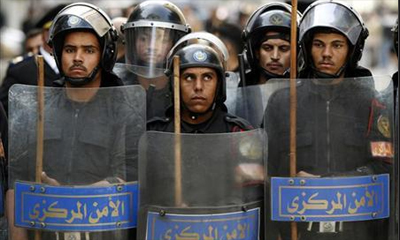
Riot police stationed by Tahrir Square during Egyptian revolution (Photo: AP)
Stationed in Tahrir Square from 25 January, police officer Mohamed*, 22, was ordered to fire on unarmed protesters:
I thought I was going to die during the 18 days. But I knew when I joined the police that it was going to be dangerous. I wanted to serve my country, so this was my duty – I simply had to get on with it.
I had never supported the revolution.
Frankly, I didn't understand it. Life under Hosni Mubarak hadn't been so bad until the last five years, and, in my opinion, it wasn't his fault. The people serving underneath him got greedy.
On 25 January, I was stationed in Tahrir Square. It was normal to see people chanting against the regime; there was a lot of anger. At the same time, we felt people were taking advantage of the situation.
When my fellow officers and I saw the sheer number of protesters arrayed before us, we all thought that someone must be paying them.
How can people camping out in Tahrir Square, without money to eat and drink, find the funds to keep them going? This was the question we kept asking ourselves throughout the 18 days.
I was scared. There were thousands of people and I didn't even have a real gun.
My orders were to use shotguns loaded with birdshot and teargas. I was never ordered to shoot live ammunition at people.
We were told to be aggressive with the protesters. They didn't order us to kill people, but, I admit, they didn’t order us not to kill people either. But it was thugs, not police, who gunned protesters down.
We were ordered not to surrender, not to fall back. 'You're responsible for yourselves,' they said, 'for everything you have – the buildings and the soldiers around you.'
When they cut the phone signal, we were effectively told: 'Do what you have to.'
We were working 18- to 20-hour shifts without breaks, trying to control the people. I was exhausted, but, in my head, I was doing my job. You get on with it. That was what we'd been trained for.
There has been a lot of criticism of the police; we always get the blame. Concerning the case of Khaled Said [the young Alexandrian man who was beaten to death by police in 2010], he was a drug dealer. Don't bring us a drug dealer and tell us not to use force.
Yes, sometimes violence was used in police stations, but sometimes you have to use force. Don't expect us to be nice to criminals when they are trying to attack us.
On the evening of 28 January, I was ordered to take several days off. So I did.
On 11 February, I went to the barracks as normal, to collect my weapon and start my shift. We didn't have a television there, so we didn't know what was going on.
Then our commander addressed us: Mubarak had stepped down.
He was very emotional; I was incredibly sad. This man, Mubarak, had been with us for 30 years. For three decades, he had protected Egypt, helping us. He was the leader of our country, and now he was gone.
We were not sent on our shifts, as the commanders were worried about our safety. I was afraid that I would be lynched by the people who hated us so much – which is something I still can't understand.
They are Egyptians, our brothers; they shouldn't hate us.
So I went home.
Some officers supported the revolution. I remember seeing one soldier coming out of a CSF truck, waving an Egyptian flag after Mubarak stepped down, singing and dancing.
If I went back in time, I would do nothing differently. These were my orders, this was my work. There is nothing to be ashamed of in that.
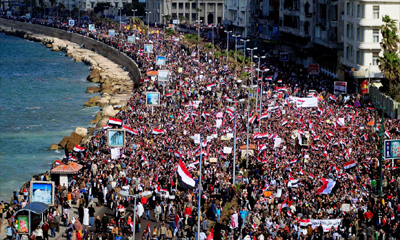
Alexandrians march on the presidential palace to declare independence (Photo: AP)
Just moments before Mubarak stepped down, Maheinour, 25, a member of Egypt's Revolutionary Socialists, helped Alexandria declare independence from Egypt:
Alexandria was always a bit different from the centralised fight in Cairo.
By 28 January, when authorities cut communications and after we had burned down the governorate headquarters, we held the city in our hands. I was astonished that we had defeated the security forces so quickly.
They were strange days. I remember learning how to make a Molotov cocktail for the first time – I was never very good at it – and weeping when we tore down a huge poster of Mubarak.
In Alexandria, we lacked the equivalent of Tahrir Square; our movement relied more on marches than rallies. We couldn't escalate with a sit-in, so we brainstormed creative ways of putting pressure on the regime, and came up with the idea of declaring Alexandria's independence.
At the time of the Khaled Said case, we had set up a committee of young members from nine opposition political movements and parties, including young members of the Revolutionary Socialists, the Karama Party and the Muslim Brotherhood.
We used to meet at Mohamed ElBaradei's campaign headquarters and arrange everything, including what would happen on 25 and 28 January.
We all agreed to declare independence on 11 February. We chose Fikry Khroubi, a local judge who was not affiliated to any party, to be the new governor.
We had already worked with municipal employees and officials, who at the time of the revolution were already striking, and got them onboard.
The plan was to besiege the Presidential Palace and declare the new governor of Alexandria at midnight.
That day, instead of the usual march from the Qaed Ibrahim Mosque, we started in west Alexandria. As we marched, the numbers grew and grew. More than half of the city was in the streets.
We surrounded the Presidential Palace as more and more people moved towards the Corniche.
At the time of the evening prayer, I saw a woman yelling from her balcony. We all thought she was happy because of the massive turnout.
Then another man on a different balcony raised his hand in a victory sign.
There was a bus driver who used to carry doctors to the frontline. Suddenly he was crying and shouting, "He's gone, he's gone."
Yet we still didn't understand.
As the prayers finished, news began filtering in and spreading haphazardly. "People starting singing, "Goodbye goodbye, son of a thief."
Finally, we got confirmation: Mubarak was gone.
People were dancing, hugging and kissing; everyone was ecstatic.
When we found out that the army was taking over, we knew deep down that this wasn't a good sign. I was afraid, as that wasn't what we had been fighting for.
But a friend of ours said, 'We have to rejoice now, as what was coming was worse.' Wise words, so we celebrated.
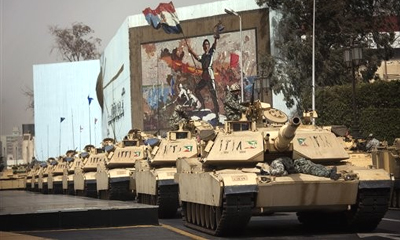
Egyptian army deployed to Egypt's street, February 2011 (Photo: AP)
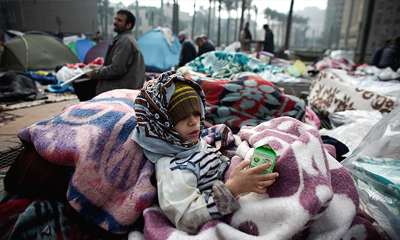
Child wakes up after a night on Tahrir Square during 18-day uprising (Photo: AP)
On the morning of 26 January, a police officer said to me that if the army was ordered onto the streets on 28 January, all the police would pack up and go home.
The military didn't say a word to us; there was a lot of tension. All we knew was that we were preparing for an emergency situation.
By 6pm on 28 January, the police disappeared and a flood of orders began coming in.
We all thought the security forces would try to control the situation together; we never imagined the people would be able to defeat the police so quickly.
The army, which had never seen action like a war, was completely overwhelmed. The situation was unprecedented.
We got orders not to harm civilians, to treat them well, to safeguard the army's reputation. We were told to be firm with armed thugs if they attacked civilians or the army. We had permission to open fire.
My job was to move the tanks and APCs to Cairo and Alexandria.
I arrived in Alexandria at 1am on 1 February.
It was a ghost city: the entrance to Alexandria, which is usually bustling, was empty. All the commercial centres were looted.
After the flurry of activity on 2 February, we were all given time off, told to stay put; to do nothing at all.
It was that afternoon that I found out about the 'Battle of the Camel' attack in Tahrir on television.
My fellow soldiers, a few higher-ranking officers and I, watched as the bloody scenes unfolded on screen. A strange silence engulfed the room.
Then one of my friends in Tahrir called. He was hysterical, crying and screaming: 'Where is the army, where were you? Nobody intervened, they left us.'
I was in no condition to speak. I was terrified for both my safety and that of my friends, as the officers all knew I had got the call. I didn't know if the phone was tapped. So I froze, hung up and sat in the garden area for three hours in silence.
It was one of the most difficult moments of my life. It was clear that the army was complicit one way or another: either it was indirectly supporting what was happening, or refusing to intervene, which is the same.
Meanwhile, my friends were being wounded, possibly killed – and I couldn't protect them.
Talk of Mubarak stepping down began to circulate in the barracks on 8 February. Most people joked that the army needed a rest.
The anger gradually became directed at [then minister of interior] Habib El-Adly, 'because of his greediness,' the soldiers said. We had wanted to stay behind the scenes, but now we were being pushed into the action.
In the middle of the revolution, my brother had been due to get married.
So I travelled home on 9 February. That night, the stories began. I received so many phone calls from colleagues and friends saying the presidential guard would fight for Mubarak or against Mubarak. Everyone had their own theory.
After Mubarak's 10 February speech, I began to worry that I would be put in a position in which the army would be sent to kill civilians. What would happen to me if I refused?
Next came wild rumours of a massacre within the army; that the division between those loyal and those disloyal to Mubarak would create an internal mutiny.
I was in such a hysterical state that my father tried to kick me out of the wedding.
I was ordered back to Alexandria. While en route, I had two hours in Cairo.
I was dying to join my friends in the protests, but setting foot in Tahrir would have meant military investigation, trial, sentence and goodbye.
Rule number one: it's forbidden for a member of the armed forces to get involved in politics. It wasn't worth the risk.
For those two precious hours, I tasted that dream by sitting in a café in Bab Al-Louq and called my friends. This was the closest I could get.
This is when I learned that people were being taken to the Egyptian Museum and tortured by army soldiers.
I was horrified, knowing that I was part of something that was doing this.
What kept me going was the fact that I only had a few days left of service. Then I'd be free.
By 11 February, I was back in Alexandria, fearing the worst. But the city was peaceful, not the tense scenes I was expecting.
Then Omar Suleiman came on TV.
Like the day of the 'Battle of Camel', I went outside, sat down and wept. This time, though, the knot in my stomach was released, so, after congratulating my friends, I slept.
Armed only with a slingshot, Osama, an 11-year-old street vendor in downtown Cairo, joined revolutionaries to fight the police:
On the afternoon of 25 January, I went down to Tahrir as usual to start work selling tissues – then I saw something was happening.
Groups of people were protesting. I found out they were demonstrating against Hosni Mubarak.
As the days went on, I learnt that Mubarak had stolen $70 billion from the country and that the government was lying and corrupt.
Later, I saw them being brutally attacked by the Central Security Forces.
Even before the revolution, I knew the police were bad; I knew about what they were doing in the police stations. They throw people in jail even if they haven't done anything, beat them and then steal their money and mobile phones.
I had been attacked three times by security forces before the revolution.
They are tough on us [children] working in the area, after catching and beating us.
My first thought when I saw the violence was that I wanted to save the people, avenge them. Why? Because I saw so many protesters injured; one died right in front of me.
I got my own weapon out, a little slingshot I carry with me, and I shot pebbles back at the security forces, who were gunning people down. I would station myself in the second row behind the frontline, slingshot ready.
My stones, however, didn't go very far.
When I first heard the gunshots and smelt the gas I was terrified. I didn't know what was going on, or what they were shooting at us. I couldn’t breathe.
I made a lot of friends in the square: people I would never normally be friends with, like engineers, doctors, people who were really smart. Everyone was so respectful of everyone.
I only stayed one night in the square, as my mother was worried. All night, all I heard was the sound of guns, all I smelt was the gas. I was really scared. A girl named Mena, a new friend, looked after me.
When things got really bad during the 18 days, I would hide in the nearby Borsa and Horreya cafes, since I knew the guys who worked there. I also had special hiding places around the backstreets, in areas I could squeeze into if I was being chased.
I was injured a lot in the 18 days. I was cut by glass on my hand and was hit in the head with a rock. But I was never shot, thank God.
I knew that Mubarak would be toppled. And I knew I wouldn't leave Tahrir until he left. After everything that had happened, we weren't going to stop. Mubarak didn't have a chance.
* Names have been changed to protect the identities of those interviewed
Short link: